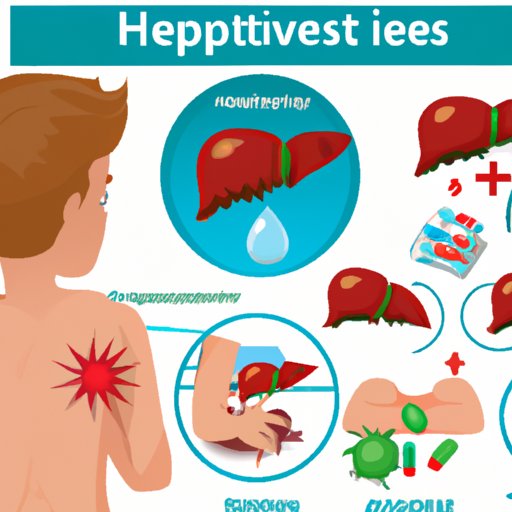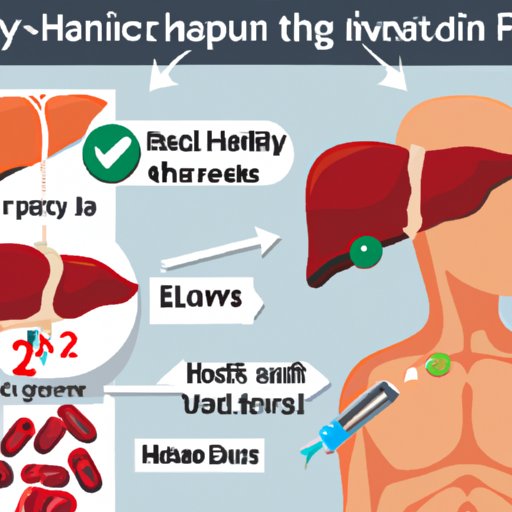
I. Introduction
Hepatitis C is an infectious disease caused by the hepatitis C virus (HCV). It affects millions of people worldwide and can cause serious liver damage and sometimes lead to liver cancer. But what are the symptoms of Hepatitis C, and how do you know if you have it?
II. 10 Common Symptoms of Hepatitis C: What to Look Out For
The ten most common symptoms of Hepatitis C include:
- Fatigue: Feeling extremely tired or worn out, often with no explanation.
- Joint Pain: Pain and stiffness in the joints.
- Nausea and Vomiting: Feeling sick to your stomach and vomiting.
- Loss of Appetite: Not feeling hungry or not wanting to eat.
- Abdominal Pain: Pain or discomfort in the upper right portion of your abdomen, where your liver is located.
- Dark Urine: Urine that appears dark yellow or brown in color.
- Clay-Colored Stools: Stools that are pale or clay-colored.
- Yellowing of the Skin and Eyes: A condition called jaundice, which causes yellowing of the skin and whites of the eyes.
- Fever: A low-grade fever.
- Bruising or Bleeding: Easy bruising or bleeding, often due to a decrease in platelets (a type of blood cell).
If you experience any of these symptoms, it is important to speak with your healthcare provider, especially if you have any risk factors for Hepatitis C, such as a history of intravenous (IV) drug use, blood transfusions before 1992, or unprotected sex with multiple partners.
III. The Silent Killer: Understanding the Sneaky Symptoms of Hepatitis C
In addition to the common symptoms, there are also “silent” symptoms of Hepatitis C that may not be as obvious. These symptoms include:
- Muscle and Joint Pain: Pain or discomfort in the muscles or joints.
- Itchy Skin: Skin that is itchy or irritated, often worse at night.
- Insomnia: Difficulty falling asleep or staying asleep.
- Depression: Feelings of sadness, hopelessness, or worthlessness.
- Brain Fog: Difficulty concentrating or remembering things.
- Weight Gain: Gaining weight without explanation.
One reason these symptoms are considered “silent” is that they can be caused by a variety of conditions, not just Hepatitis C. As a result, they may not be immediately linked to HCV, and can go undetected for a long period of time.

IV. Hepatitis C: How It Can Affect Your Body and Its Symptoms
Hepatitis C primarily affects the liver and causes inflammation of the liver, leading to various symptoms. Other organs and systems in the body can also be affected in some people.
The severity of symptoms can vary widely from person to person. Some people may have mild symptoms that go unnoticed, while others may experience severe symptoms that interfere with their daily lives.
V. Spotting the Signs and Symptoms of Hepatitis C Early
Early detection of Hepatitis C is essential for effective treatment and prevention of liver damage. Some early symptoms of Hepatitis C infection include:
- Fever: A high fever (often accompanied by flu-like symptoms).
- Fatigue: Feeling extremely tired or worn out, often with no explanation.
- Joint Pain: Pain and stiffness in the joints.
- Nausea and Vomiting: Feeling sick to your stomach and vomiting.
- Abdominal Pain: Pain or discomfort in the upper right portion of your abdomen, where your liver is located.
If you experience any of these symptoms, particularly if you have any of the risk factors for Hepatitis C, it is important to speak with your healthcare provider about being tested for HCV.
VI. Uncovering the Top Symptoms of Hepatitis C Infection
In some cases, Hepatitis C can cause more severe symptoms. These include:
- Ascites: A buildup of fluid in the abdomen, causing swelling and discomfort.
- Encephalopathy: A condition in which toxins build up in the brain, leading to confusion, memory loss, and other cognitive problems.
- Portal Hypertension: High blood pressure in the veins that supply blood to the liver.
- Variceal Bleeding: Bleeding from the veins in the esophagus or stomach, often caused by portal hypertension.
- Hepatic encephalopathy: A condition in which toxins build up in the brain, leading to confusion, memory loss, and other cognitive problems.
- Cirrhosis: Scarring of the liver, often leading to liver failure.
- Liver Cancer: Cancer that begins in the liver and can spread to other parts of the body.
If you experience any of these symptoms, it is important to seek medical attention as soon as possible to prevent further damage to your liver and other organs.
VII. Hepatitis C: A Comprehensive Guide to Identifying Symptoms
Overall, some of the most common and less-obvious symptoms of Hepatitis C include:
- Fatigue
- Joint Pain
- Nausea and Vomiting
- Loss of Appetite
- Abdominal Pain
- Dark Urine
- Clay-Colored Stools
- Yellowing of the Skin and Eyes
- Fever
- Bruising or Bleeding
- Muscle and Joint Pain
- Itchy Skin
- Insomnia
- Depression
- Brain Fog
- Weight Gain
- Ascites
- Encephalopathy
- Portal Hypertension
- Variceal Bleeding
- Cirrhosis
- Liver Cancer
Diagnosing Hepatitis C based on symptoms alone can be difficult, as many of the symptoms are similar to those of other conditions. However, if you have any of these symptoms, particularly if you have any of the risk factors for Hepatitis C, it is important to speak with your healthcare provider and get tested for HCV.
VIII. From Fatigue to Joint Pain: Exploring the Range of Hepatitis C Symptoms
The symptoms of Hepatitis C can manifest in various ways throughout the body. For example, fatigue and joint pain may be related and caused by the body’s response to inflammation caused by the Hepatitis C virus.
The liver is responsible for metabolizing many substances in the body, including medications, alcohol, and toxins. When the liver is damaged, it can affect a person’s ability to metabolize these substances, leading to a variety of symptoms throughout the body.
IX. Conclusion
Knowing the symptoms of Hepatitis C is essential for early detection and effective treatment of the virus. The symptoms of Hepatitis C can vary widely from person to person, so it is important to be aware of all the common and “silent” symptoms.
If you have any symptoms of Hepatitis C, particularly if you have any of the risk factors for the virus, it is important to speak with your healthcare provider and get tested for HCV as soon as possible. With early detection and treatment, it is possible to manage the symptoms of Hepatitis C and prevent further liver damage, leading to a better quality of life.




